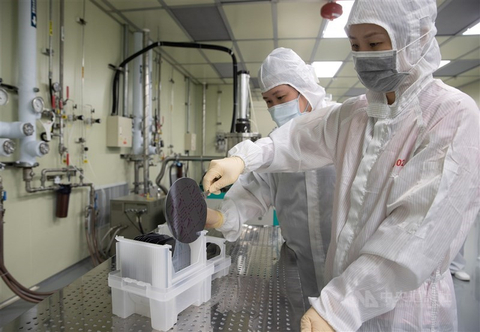Ex-TSMC Exec Urges Stronger Taiwan-U.S. Cooperation Amid Chip Tariff Threat
Central News Agency
Jay Chen
Email: sjenjey.chen@cna.com.tw
Phone: +886-2-25051180 ext. 602
If the United States imposes tariffs on Taiwan-made semiconductors, Taiwan should work actively to enhance industrial cooperation with the U.S. to mitigate potential impacts, according to a former executive at Taiwan Semiconductor Manufacturing Co. (TSMC).
This press release features multimedia. View the full release here: https://www.businesswire.com/news/home/20250210102823/en/
tyle="width: 480px; float:left; padding-left:0px; padding-right:20px; padding-top:0px; padding-bottom:0px;">
Technicians examine silicon wafers in a fabrication plant in Taiwan. CNA file photo
"Taiwan should consider how to build on its edge in semiconductor manufacturing and combine it with U.S. strengths in innovation and applications to address the threat," Yang Guang-lei, former director of TSMC’s R&D Division and former senior technical advisor to Intel, told CNA.
On Jan. 27, U.S. President Donald Trump suggested that the U.S. should impose tariffs of up to 100 percent on Taiwan-made semiconductors, without providing any further details.
"If Trump sees the semiconductor tariff policy through, it will affect companies in both Taiwan and the U.S.," Yang said.
"The prices of Taiwan-made semiconductors will be much higher in the U.S., weakening the competitiveness of Taiwanese vendors in the U.S. market and providing competitors such as Samsung and China with a chance to grab market share," Yang said.
"Yet given that Taiwan has an extremely high share of the U.S. semiconductor market, any supply disruption could have an adverse effect on American companies," Yang said.
"Given those conditions and Trump's desire to use tariffs to bring manufacturing back to the United States, Taiwan should rethink its role in the global semiconductor market," Yang suggested.
He urged Taiwan to actively collaborate with the U.S. to meet the challenges of global technology competition, including the possibility of transferring technology to the U.S. and sharing its 30 years of semiconductor manufacturing expertise.
"The two sides could cooperate in areas of common development, such as integrating AI into semiconductor manufacturing, the manufacturing of military goods, and other niche market areas," Yang said.
"Through cooperation, the U.S. could gradually expand its manufacturing capabilities, while Taiwan could maintain its global advantage by fostering a mutually beneficial relationship with the U.S.," Yang said.
One example he cited was a partnership between Taiwan's United Microelectronics Corp. (UMC) and Intel in 2024 in which the two collaborated on a 12-inch wafer platform that combined the U.S. company's sizable capacity with UMC's mature process wafer production experience.
"Efforts to develop such areas of collaboration could help Taiwan maintain its competitive advantage in the global semiconductor market while deepening its long-term partnership with the U.S.," Yang said.
View source version on businesswire.com: https://www.businesswire.com/news/home/20250210102823/en/
 Business wire
Business wire 











Add Comment